Every so often, fate relents. Pretty much the moment we arrived in Triscombe and stepped into the warm glow of our little log cabin, we knew we were going to have a good time there. Over the weeks that followed, I fell completely in love with the place, the area, the lifestyle. If we hadn’t been renovating our house, I’d have lobbied hard to stay.
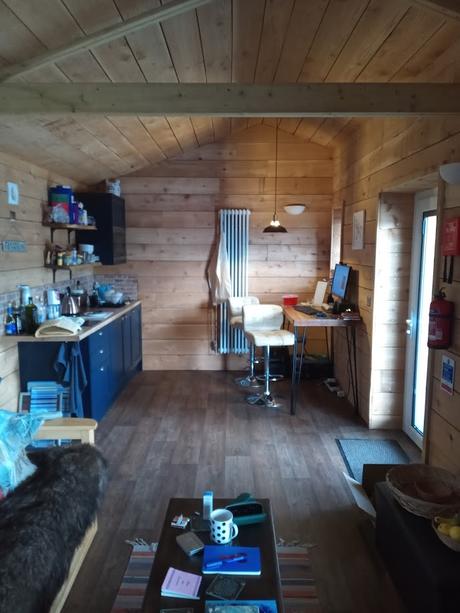
People had been saying to us, was it really a good idea to go and live in one room? But if that one room is extremely comfortable and cozily warm, with the best shower ever in the ensuite, and wonderful people as your hosts up the road, then yes. The cabin was long and low, panelled in rough hewn wood and solid as the Quantock Hills, which rose like a natural rampart behind us. At night, in our comfortable bed, we lay and listened to the winds of the winter storms howling far overhead with an intense sense of wellbeing, protected, warm and safe. I fell hard for the countryside, which has a kind of storybook beauty, the epitome of that rolling, lightly wooded land of far, far away. Most people we told forgot where we were really going and assumed it must be Devon or Cornwall. But Somerset is better because it is hidden in plain view. We were about twenty minutes from the coast, about the same from the great purple bulk of Exmoor, and it was very rural, very quiet, very peaceful. Every phone call my mother would ask, but you have a shop near you, don’t you? And every time I would reply, no, it’s a fifteen minute drive for a pint of milk. She had a deep distrust of any place so under-resourced, but I was beginning to see the benefits of not living crammed up against other people. I could sum it up this way: most of the roads were single carriageway with passing places, and on the relatively rare occasions I met another car (or tractor), there was no aggro or intimidation, no battle of wills. Instead, we reversed, we squeezed past, we smiled, we all waved thank you at one another, and went on our way. Courtesy on the roads. Quite incredible.
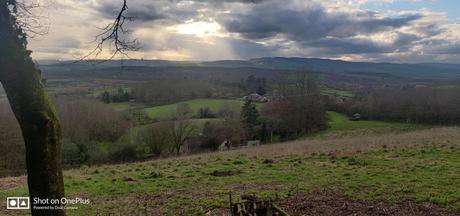
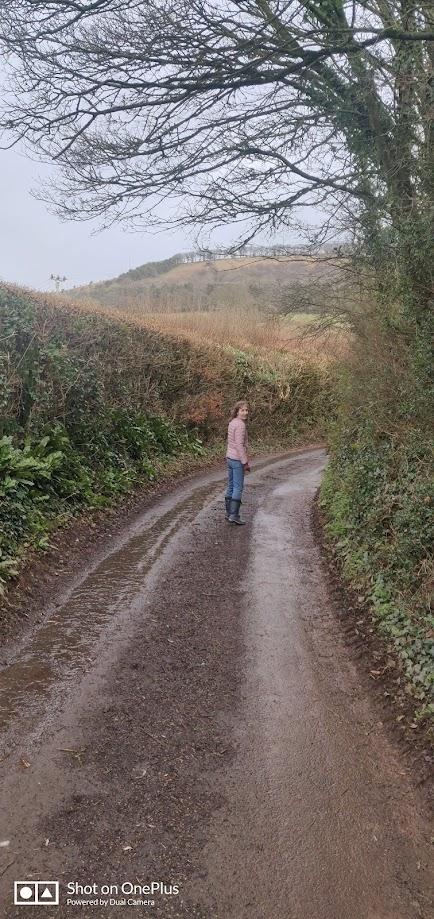
I’m a bad traveller: the disruption makes more of an impression than the destination. But living somewhere different for a while – and this was very different to East Anglia – was a joy. The unfamiliar surroundings, the new routines, the different faces, all gave us an unusual gift: the chance to reinvent ourselves. Within a couple of weeks, Mr Litlove had been transformed by his experience of the workshop. Williams & Cleal is a terrific place, a little haven for nurturing creativity, lots of support in design, lots of attention paid to precision in making. Mr Litlove loved being surrounded by other makers, and I wondered whether the ransacking of his own workshop was perhaps a nudge towards finding something more collective when we were back home (though there seems nothing like this anywhere near us). He needs people. He benefits from routine. I was invited to all their social events and sometimes called on Mr L in the workshop, and I – with no great need of people – loved talking art and creativity with them. They were a special bunch.
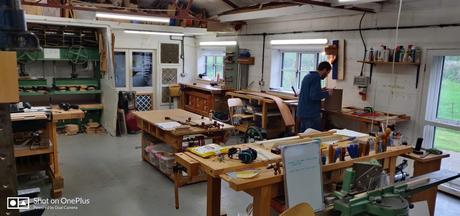
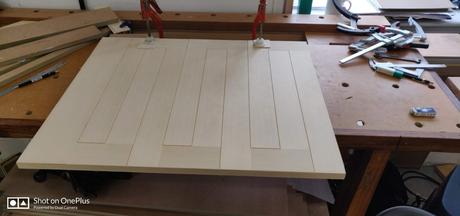
My (re)treat was to sign up for an online course, working through The Artist’s Way by Julia Cameron under the guidance of Louise Tucker. I’d just thought it would be fun to do – and it was, mostly because of Louise and the other women on it, who were a delight – but it turned out to be more apt and well-timed than I had expected. The book is a series of essays and exercises designed to help you work on your artistic self, in particular, dealing with any creative blocks and limiting beliefs you may be holding. I never think of myself as especially blocked because generally, I just like writing and I don’t have to force myself. But at that time, I was starting out on the fourth structural rewrite of a novel I’d begun in 2020’s lockdown, and frankly, I was jaded. I wasn’t sure that my usual determination to reach the end of a project would overcome the entropy and malaise involved in rewriting 90k words, each one of which required extraction by forceps without anesthetic. Doing the course obliged me to stop pushing the Sisyphean rock uphill and have a good look at it instead.
The writing fatigue was understandable, if not easily solvable. No, the real problem for me was emotional. As soon as I get near to selling something, all the pleasure goes out of it. I have a problem with the book industry as it is at the moment. I think it’s become about power and ego, with agents and editors often careless or ruthless towards writers who are supposed to be submissive. I don’t like the pile-ons that happen in social media (also about power). And most books just die quietly unread for lack of publicity. I’m not saying that great books don’t come out of this – sometimes they do. But I think it’s a deeply unhealthy environment for writers to work in. I haven’t come to any conclusions about what I should do, but there’s a way to go yet before I’ve written a novel I’m proud of. So the course gave me a lot to think about.
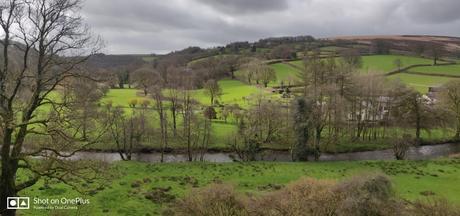
And so winter melted into spring, the clocks went forward, our birthdays and Easter passed by, and there was only one problem with Somerset: we were going to have to leave it. I ended up returning a week early because the builders had reached the stage where they really needed one of us on site to make decisions. As it happened, we went back to the cottage we’d been renting before, because the landlord’s renovation plans had been delayed, and our house wasn’t ready to camp in. Mr Litlove drove me back and as soon as we reached the village, we eagerly rushed across the green to see what the new build was like – and the moment we stepped inside we started rapidly shedding layers of outdoor clothing. The atmosphere inside was tropical, as hot as a sauna with condensation running down the windows. The heating had recently been put in and the builders needed to dry out the screed, so they’d switched it on without leaving any windows open. There were plastered walls up now, the start of tiling in the bathrooms, new spaces we experienced in a sweaty daze, but everywhere was filthy, furred by plaster dust and grit and grime, littered with boxes of supplies, discarded packaging materials and tools. The months of wet weather had caused mold to form in patches on all the downstairs walls, and our belongings, piled in the upstairs spare room like an afterlife treasury in the Valley of the Kings, reproached us with their uselessness. We hadn’t needed these things for months now. What was all this crap, and why were we keeping it? The amount of work to be done before we could move back in was overwhelming.
And then, three days later, my mother suffered a major stroke.
The first time I walked into the acute stroke ward at the hospital, I didn’t recognize her. And then when I did, I felt sick. My mother had gone, leaving a bundle of bones that barely made a hump in the institutional blue blanket. Her face had the glazed look that strokes bring, and she was almost completely immobile. We wouldn’t get her diagnosis for a couple of months, but she had suffered a major incident, deep in the brain, and this was on top of a number of small prior incidents that we hadn’t been told about (although she’d been in A & E a handful of times over the previous few years). She stayed in the acute ward for about ten days before being transferred to a rehab unit on the coast. There was some rehab, but not an awful lot. The Stroke Association produced a report recently that says only 13.3% of stroke patients receive the recommended amount of rehabilitation, such is the impoverished state of the NHS, which means that the average amount of time spent on support is less than 4 minutes a day. And my poor mother, who hates hospitals, was stuck there lonely and bored and probably stressed for six weeks until the doctors decided there was nothing more they could do for her. Throughout this time, my Dad and my brother visited her daily. My brother lives five minutes from our parents and is the person you want beside you in a crisis – stalwart, utterly reliable, a sensible problem solver. He’s been a complete hero and we are lucky to have him. We visited when we could, the rest of the time cleaning and sorting and painting our house. I didn’t have the energy to unpack our suitcases yet again, so we camped in the cottage, where shortly the boiler conked out, never to be replaced. And then, in the midst of all this, Mr Litlove caught Covid. It was a crazy, exhausting time.
Let’s fast forward to the present day and where we all are right now. We moved back into our house three weeks ago, which was not a moment too soon. After all our travels I developed a craving for my own space, for our new space. It is strange and wonderful to be here, with the front of the house much as it always was, and then the back entirely transformed. There’s a Narnia feel to moving between the rooms, and I sense the possibility of being different here, of living differently. There is still a ton to do, but time now in which to do it.
My mother is also back at home, with my Dad – from the generation of men who never even needed to look after himself – as her full-time carer. Mum has the use of her right hand and arm. She can talk (the injury was to her right brain) and feed herself and smile again, but that’s about all she can do. They are both being very brave and stoic and it breaks my heart. I batch cook for them, and we visit regularly, but I feel horribly inadequate. I take this as a useful reality check. I want to fix and to rescue, to give them back their old life, their old selves, and none of this is possible. I haven’t got the hang of things yet, and approach them the way I would a 9 am lecture on a Monday morning with the second years. I try to pick them up and hoist them across my shoulders and carry them over the rocky terrain they find themselves on, and when I catch myself doing it, I think, really Litlove, this again? Years ago I fought my family quite hard to get a special dispensation for CFS, an agreement that I wouldn’t overstretch myself energetically and of course now that I have it, I don’t like it. I feel it reflects badly on me, like I’m not equal to doing whatever is necessary under the circumstances. Please understand, no one is making me feel like this apart from myself. My parents are simply grateful for any love and support, even if it comes in unnecessarily amped up form. No, what I see again and again, is how complicated our emotions are. How convoluted their roots and their triggers. We do ourselves and others such a disservice by assuming too often that what we feel is a direct response to what is right in front of us.
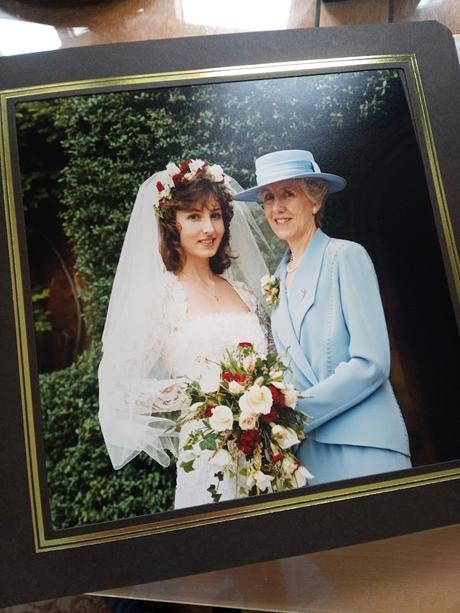
This is my favorite photo of us. I am 24, Mum is 51, so this was 31 years ago, which is to say back when I knew nothing. My mother had made my dress, incidentally. She had skills, my mother, and was beautiful, could be very funny and insightful, and when she was happy and loving there was no one like her. But she was was an easy prey for fear and put a lot of energy into her insecurities. I am aware I have the capacity to do the same. I own that DNA. This little series of posts has begun and ended with confronting mortality, and in each case I find myself with the same question: what makes a good life? After my treatment, I rushed into the world, accepting all the challenges, seeking change and action and adventure. I felt I’d cooped myself up for too long with all the insecurities that were the legacy of CFS. And it was fun in its way, but I lost track of myself, too, for I am easily erased in my own mind by the demands of other people and other places. ‘Think of yourself as dead,’ Marcus Aurelius wrote. ‘You have lived your life. Now take what’s left and live it properly.’ If I am to keep writing here, then these are good mantras to think about. What is it to live properly? What makes a good life? It’s implicitly at the heart of every book I read. It’s a place to start.
